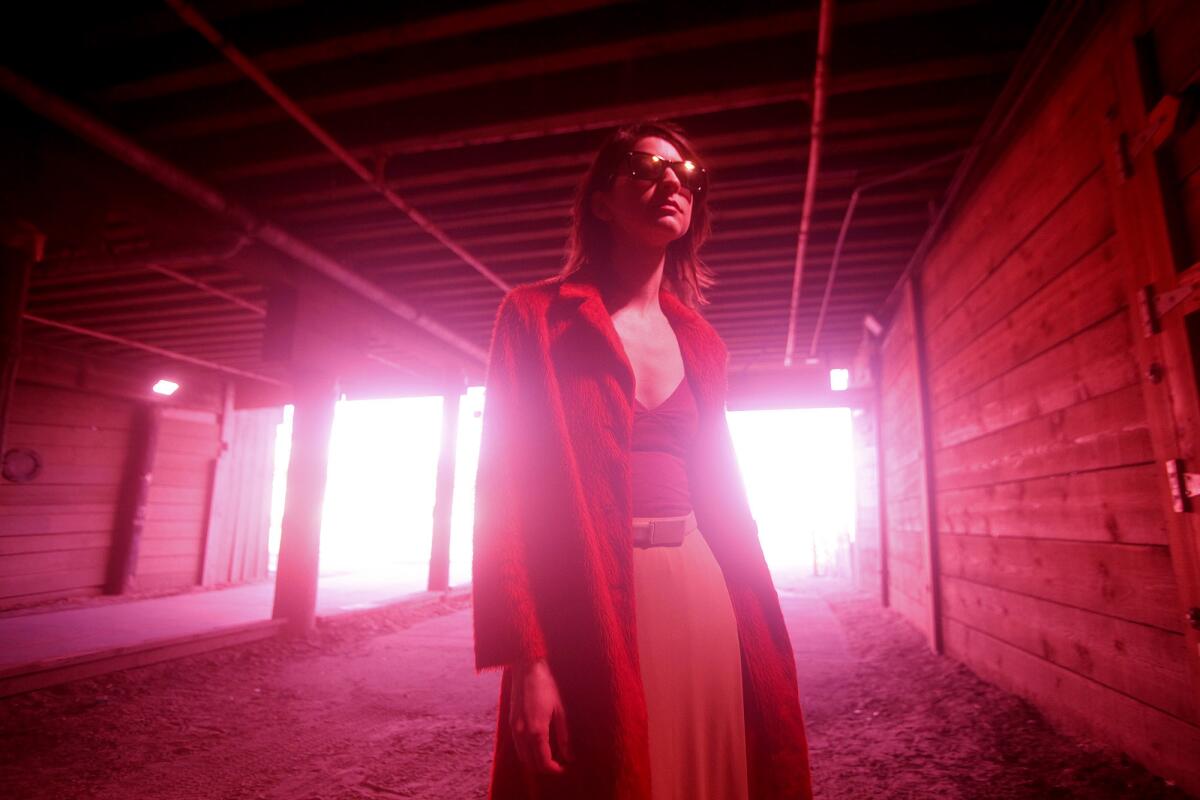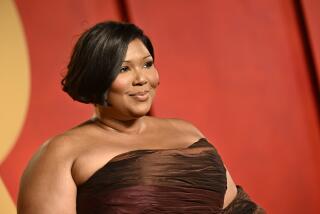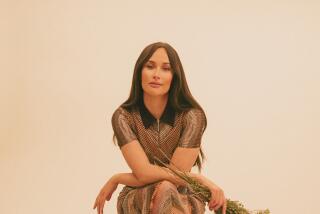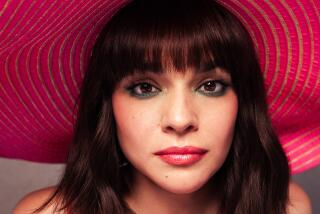Colleen Green takes on mature outlook on album ‘I Want to Grow Up’

Colleen Green’s latest album opens with a statement that doesn’t sound like rock ‘n’ roll.
“I think I need a schedule,” she sings on “I Want to Grow Up,” a song that also doubles as the title of her third album. Just as the strum of guitars grows louder, she declares that she’s ready for more responsibility than a calendar can provide: “I’ve had my fun. I want to be old.”
In a pop-cultural landscape where maturity is second to social media-driven narcissism — and in a genre, punk rock, where suspended adolescence is often a requirement — the Santa Monica-based singer-songwriter wants to turn off all the noise and become an adult. At 30 years old, Green is done with the parties (mostly), frustrated with dating (who isn’t?) and maybe a little tired of being a broke musician.
“Sweet,” she says when a reporter offers her a lift home after the interview, “you saved me $1.75 in bus fare.”
But “I Want to Grow Up” isn’t so much a coming-of-age album as it is an album about wondering why growing up is taking so long.
“In pop music in general there’s a focus on youth,” she says. “That’s great, I get it — it’s all just a theme, but I don’t want to take things for granted, and I see a lot of my peers actively trying to not grow up.”
Throughout, her guitars are loud and her voice is wistful as Green sort of hangs behind the riffs as if to converse with them rather than steer them. The result? Her songs have a detached, aggressively dreamy sound, one that toes the line of sincerity. As serious as she addresses adulthood, one can’t help but wonder if she isn’t winking a little too.
In one song, she’s tired of being self-absorbed. In another, she can’t stomach any more small talk, and in the album’s six-minute centerpiece, “Deeper Than Love,” she’s worrying she’s not the “marrying kind” while confessing that she wants to know “real love so desperately.” Elsewhere, however, her favorite companion is the television set.
She’ll be appearing at downtown L.A.’s Smell on Feb. 15 and Hollywood’s Amoeba Music on Feb. 24, the same day as the release of her album.
“She’s doing something that’s kind of a tricky balance, where her songs have humor in them yet they have heart in them too,” says Daniel Cook, owner of Highland Park’s Gimme Gimme Records. “If you look at her song titles, you think it’s just going to be a goof, but there’s something personal about them. There’s a lot of thought behind them. It’s not a goof. She’s trying to make a point, even if her mode is funny.”
“I can’t even remember what I’m interested in,” she sings in the hard-hitting “Pay Attention,” where meaningless chitchat sets her ADD aflame. She wants to “rid myself of toxicity” in the crunchy “Things Are Bad for Me (Part I)” and then wants to combat the part of her brain that’s “set to self-deprecate” on “Things Are Bad for Me (Part 2).”
Intentional or not, Green’s third album — her first with a backing band — taps into a particular generational confusion. The good jobs are gone, technology is making a mess of courtship, and old-fashioned ideals, where men are the head of the household, are evaporating.
“In the past, you would just get married,” she says. “That’s what humans do. You get married, you have kids and no one questioned it. Now, among women, it’s questioned. It still feels weird, though. I don’t think we’re out of the woods. For me, personally I had to realize I was 30 and not done living life for me yet.
“My mom had two toddlers when she was my age. That’s pressure, but I don’t have to do anything. That’s something I’ve been realizing. I don’t have to get married. I don’t have to have kids. I can do anything.”
Green has had a lot of time to ponder where she is — and we as a society are — heading, as she’s been living rent-free with her television-editor brother since she was diagnosed with a rare auto-immune disorder, myasthenia gravis, six months after moving from her native Massachusetts to Oakland in 2008. Myasthenia gravis affects the muscles and central nervous system, paralyzing a victim’s muscles if untreated. While it’s clear Green doesn’t want the affliction to dominate the interview, there’s no denying it drastically altered her outlook.
When diagnosed, Green was playing in a band going nowhere and working a dead-end job. It quickly became clear this life wouldn’t be sustainable.
“I was working at Old Navy and living in Oakland. It was cool and stuff, but once I got sick I was like, ‘I cannot do this anymore. I cannot drink. I need to be healthy,’” she says. “I looked really weird. The muscles in my face weren’t working. I had to get out. I had to get away from the party. It was an epiphany.”
She considered moving home, but her brother’s offer was more appealing, because it allowed her to hole up in a bedroom and write. After all, long before the diagnosis Green decided she wouldn’t be putting her degree from UMass Lowell to work. “Once I went through the whole marketing program I was like, ‘This sucks.’ It was basically professionally lying and manipulation, and that’s not what I wanted to do.”
Since moving to Southern California, Green has tried to limit distractions to focus on her art. She requests an interview take place at the Santa Monica Aquarium because she hasn’t had the time to visit it, and why not use the work outing as an excuse? When she snaps a photo of jellyfish, she does so with an old flip-phone, as Green has been trying to live with few extravagances.
At one point she begins pricing out a tour to Europe. At another, she leads the way to a tourist shop to thumb through cheap sunglasses (she performs in them and is rarely photographed without them). Working today with Hardly Art, an imprint of Seattle’s famed Sub Pop Records, her future is finally looking a little brighter, as Green notes she’s made a bit of money thanks to one of her older songs being licensed by HBO’s “The Leftovers.”
“Moving to L.A. ended up being a really good thing, but at first it was a symbol of my disease and being beaten down and having to retreat and crawl into a hole,” she says. “I didn’t know anyone here. I was so sad. Now I’m better and awesome stuff is happening.”
This, even though she believes Los Angeles can breed the sort of endless adolescence “I Want to Grow Up” is attempting to fight.
“This is the place to come for that,” she says. “There’s no seasons. On the East Coast, you note the passing of time. You have that punctuation of the seasons to go, ‘Oh, yes, a year has passed.’ It’s a reset button, but here it’s a fluid, continuous line with no reset button, and I think people get caught up in that.”
Twitter: @ToddMartens
More to Read
The biggest entertainment stories
Get our big stories about Hollywood, film, television, music, arts, culture and more right in your inbox as soon as they publish.
You may occasionally receive promotional content from the Los Angeles Times.







